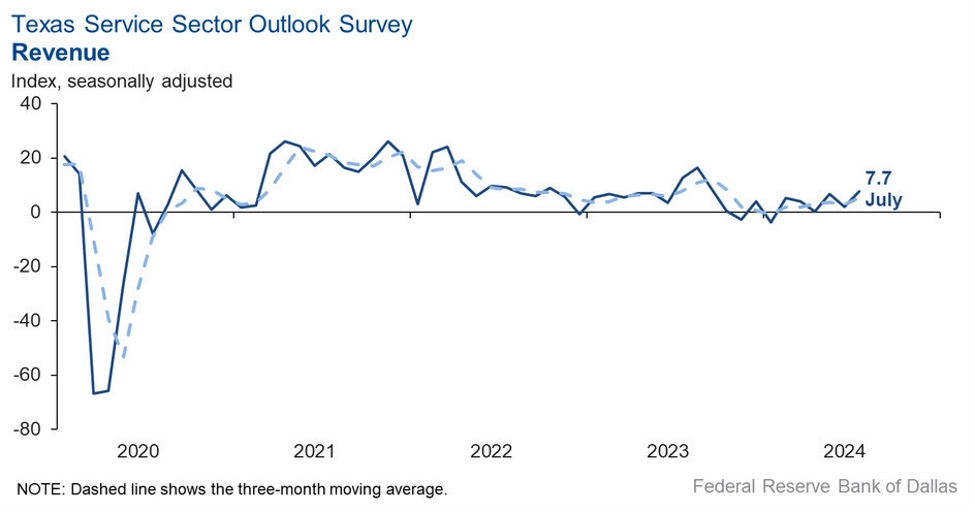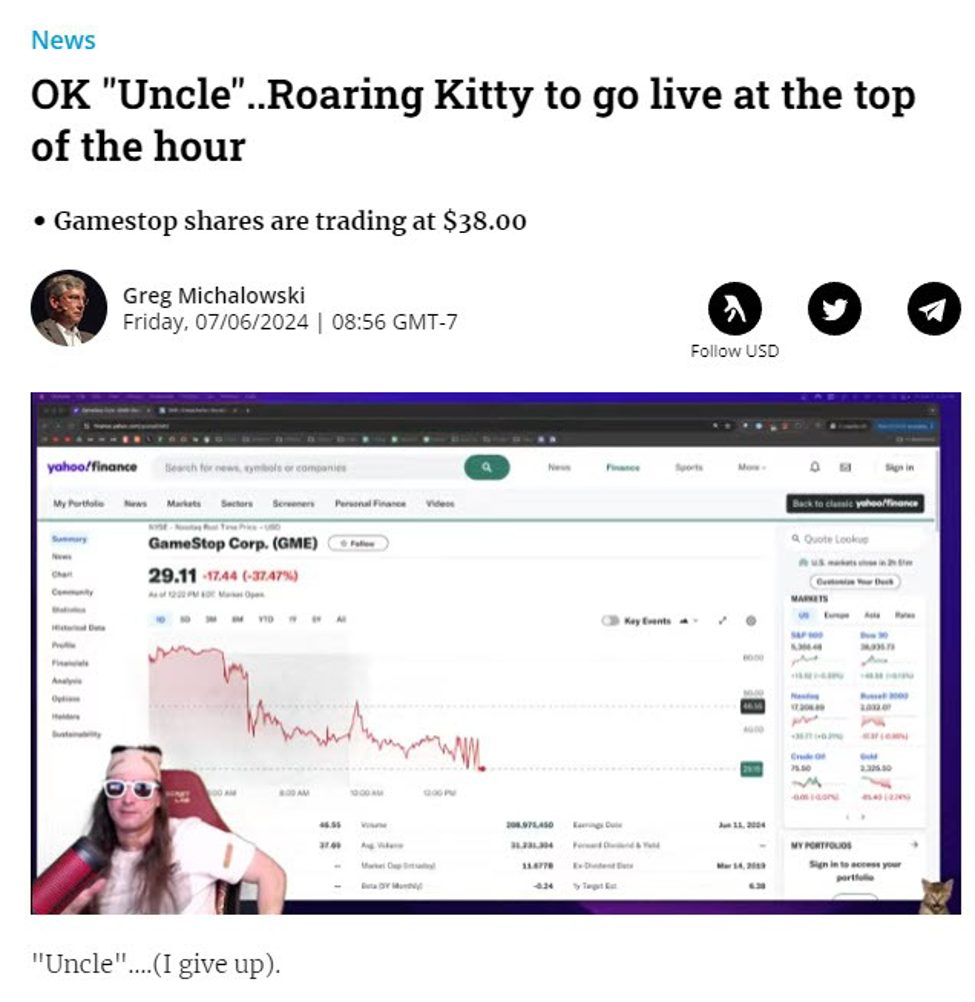
- Prior was +1.9
- Service sector outlook -0.1 vs -4.1 prior
- The employment index -0.2 vs +1.8 prior
- The input price index fell from 24.7 to 21.8 and the wages and benefits index moved down from 16.4 to 13.4
- Retail sales outlook -18.1 vs -18.1 prior
Comments in the report:
Utilities
- It feels like the economy is getting better.
Pipeline transportation
- We expect Permian Basin oil demand to grow 200 million to 300
million barrels per day across 2024. More volume drives our
expectations for revenue growth.
Support activities for transportation
- Bad local cotton crop expected due to bad weather.
- Our industry has seen an increase in activity and a hairline increase in selling prices.
Warehousing and storage
- We think some good news on the inflation front provides hope for
a soft landing and maybe even a potential rate cut that could spur
additional business.
Publishing industries (except internet)
- New advanced, customer-built, do-it-yourself lessons via
software capabilities have been offered for mixed reality training with
AI assisted metrics. More training opportunities are emerging within the
Department of Defense, showing interest in the development of apps. New
and more advanced software and licensing are the main reasons for a
better outlook, not current economic conditions. - There is still a high amount of uncertainty about rate cuts and,
subsequently, cost of capital. Simultaneously, we are wary that
consumer spending will not hold up over the next six month unless
something changes or there is more liquidity in the system. The election
and the impact that will have on economic policy and rates are also
adding to the uncertainty and ambiguity. We are hesitant to
forward-invest until the Federal Reserve behavior and economic data
suggest the economy has achieved some sort of soft landing.
Credit intermediation and related activities
- The political climate has intensified the feeling of
uncertainty, especially after the assassination attempt on former
President Trump. Economically, the rural markets are fairly steady but
not robust. The most prevalent inflationary pressure across the board is
the increase in insurance premiums including health insurance for
employee coverage. Auto, homeowners’ coverage and liability insurance
premiums have been substantial. We are beginning to hear of lower income
families dropping or not renewing coverage of their homes. The interest
rate on residential real estate, combined with escrow for insurance and
taxes, is increasing debt service coverage for anyone financing a home.
Insurance carriers and related activities
- Business is stable. Insurance increases are moderating somewhat. All eyes are on the November election currently.
Real estate
- The presidential election causes uncertainty. House inventory remains low.
- Interest rates in the form of mortgage rates are the question mark. Lower rates are good for our business.
Rental and leasing services
- We finished 1Q 2024 down 2 percent compared to 1Q 2023. The
second quarter was even slower, ending down 9.6 percent. We averaged
over 10 percent growth in revenue per year for over 65 years, so that
makes us think these quarterly reports are more than just an anomaly. We
think the Federal Reserve has finally gotten this economy pulled back;
whether they have killed it or not is yet to be seen.
Professional, scientific and technical services
- This is the worst month we have had since the Great Recession.
It was even worse than the first month of the pandemic. There are almost
no new starts on multi-family or self-storage, and building permits are
well down. We have seen increased activity in new prospects, leads, as
well as deals. We suspect this is due to a combination of sales and
marketing efforts, as well as the slight easing in inflation, which has,
in turn, likely improved business and consumer confidence. - The pace of business activity has slowed down. Operating cost
has increased, including the cost of software subscriptions and facility
maintenance. Also, there’s been a loss in productivity due to hurricane
preparation and summertime vacation. There is a general sense of a loss
of momentum and uncertainty. - Changes in the presidential race have created significant added
uncertainty as to the future regulatory climate in the energy sector. - The real estate market has been stagnated for the past year and a
half and will remain so until interest rates stabilize. We are hoping
this is the bottom, but until regional banks find a way to begin making
loans, the real estate market will not recover. We are at a breaking
point if the banks start taking property back and cannot find a way to
make loans. - We are a recruiting company. Our retained search side has been a
little busier this month than last month, and we hope to have even more
work in August and for the second half of the year. Our outsource
recruiting side has been the same this month versus last month, but we
hope it will grow.
Administrative and support services
- The bottom has fallen out of the professional-level hiring
market. Clients are not hiring or are very slow to make decisions. The
cost of money for our clients (and for us) is preventing us from hiring
and optimizing production in our businesses. We are living on the edge
of recession and truly need the Federal Reserve to take action and start
to lower rates. Layoffs are imminent. - There is still pressure on wages and the ability to hire employees at line-level blue collar work.
- We are concerned about interest rates, but economic activity seems strong.
Ambulatory health care services
- We were dramatically affected by Hurricane Beryl and the power
outages this month. Then we were affected by the Crowdstrike update
issue as well. We lost significant business due to these factors in
July.
Texas Retail Outlook Survey
Amusement, gambling and recreation industries
- Weather has been the real negative factor for our business.
Accommodation
- Hurricane Beryl caused a drastic change in our business,
increasing our occupancy and revenue dramatically over the previous
month and same time last year. We also experienced some damage that
caused us to have some capital expenses, but minimal for the most part. - In our market, we manage three hotels, one downtown and two on
the northside of our city. The two on the northside are performing as
expected. Downtown demand has been sluggish. Factors that are
contributing to this issue include a lack of group business and
construction throughout our downtown area. For the first time in a
while, we have had a restaurant on the riverwalk close due to the lack
of demand. Based on our advance bookings, this will continue to play out
until we get into fall.
Merchant wholesalers, durable goods
- We are seeing a softening in sales to the construction market.
Merchant wholesalers, nondurable goods
- The best words to describe retail are stagnant or grinding day to day.
Motor vehicle and parts dealers
- We have a challenging business model. We are seeing margin
compression. Inventories are abnormally high and the cost-to-carry is
severely impacting profitability. Affordability is a major issue and
ongoing concern. - Demand for new and used vehicles continues to be strong. Inventory growth has slowed down and is starting to plateau.
Electronics and appliance stores
- Retail is struggling.
Building material and garden equipment and supplies dealers
- The lumber market is weak, and sales seem to be flat from month to month, with no real signs of improving.
- There is very little activity. The combination of steel prices
decreasing and the promise of lower interest rates sometime in the
future is causing everyone to delay.
This article was written by Adam Button at www.forexlive.com.
Source link



